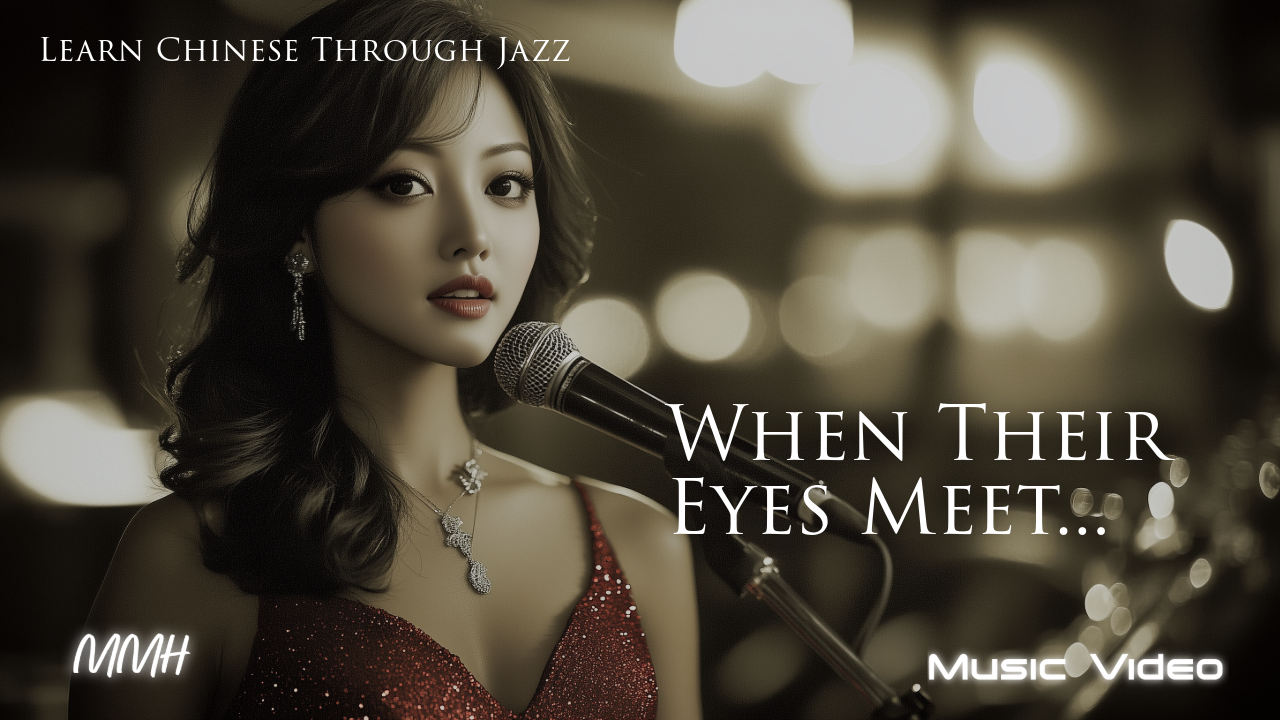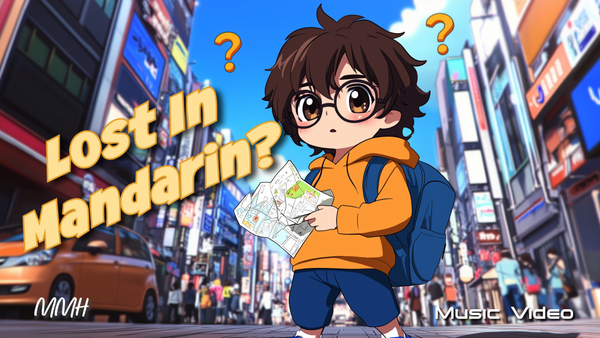Learn Chinese Jazz Romance: When Our Eyes Meet

Experience the magic of a jazz club romance while learning essential Mandarin love vocabulary through this intimate musical story.
🎵 Watch & Listen
Originally Released Novmber 22, 2024
🎮 Practice with Interactive Flashcards
Ready to master all the vocabulary from "When Our Eyes Meet"? Our interactive flashcard app includes every word from this song with multiple study modes, progress tracking, and spaced repetition.
→ Practice "When Our Eyes Meet" Flashcards
The Story Behind the Song
"When Our Eyes Meet" (目光相遇 / Mùguāng xiāngyù) captures one of the most universal experiences in romance—that electric moment when eyes lock across a crowded room. Set in an intimate jazz club, our story follows a talented performer who falls for someone in her audience, creating a beautiful tension between professional composure and personal longing.
This bilingual jazz ballad seamlessly weaves Mandarin and English together, reflecting the international, cosmopolitan atmosphere of a modern jazz venue. The Chinese lyrics focus on internal emotions and stolen glances, while the English portions express the more direct romantic sentiments, creating a perfect balance for language learners.
The song is particularly valuable for intermediate Mandarin students because it introduces sophisticated romantic vocabulary and grammar structures within an accessible musical context. You'll learn everything from basic emotions to advanced patterns like causative verbs (让 ràng) and temporal clauses, all while enjoying smooth jazz melodies.
Complete Song Lyrics
Verse 1
{每天|měi tiān - every day}{晚上|wǎn shang - evening}{在|zài - at}{这里|zhè lǐ - here} ({měi tiān|每天 - every day} {wǎn shang|晚上 - evening} {zài|在 - at} {zhè lǐ|这里 - here})
Every night here
{唱|chàng - sing}{着|zhe - continuous action}{jazz}{的|de - possessive}{旋律|xuán lǜ - melody} ({chàng|唱 - sing} {zhe|着 - continuous action} jazz {de|的 - possessive} {xuán lǜ|旋律 - melody})
Singing jazz melodies
{但|dàn - but}{今天|jīn tiān - today}{晚上|wǎn shang - evening}{不|bù - not}{一样|yī yàng - same} ({dàn|但 - but} {jīn tiān|今天 - today} {wǎn shang|晚上 - evening} {bù|不 - not} {yī yàng|一样 - same})
But tonight is different
{因为|yīn wèi - because}{你|nǐ - you}{坐|zuò - sit}{在|zài - at}{那里|nà lǐ - there} ({yīn wèi|因为 - because} {nǐ|你 - you} {zuò|坐 - sit} {zài|在 - at} {nà lǐ|那里 - there})
Because you're sitting there
Chorus
When our eyes meet across the room
{我|wǒ - I}{的|de - possessive}{心跳|xīn tiào - heartbeat}{快|kuài - fast}{起来|qǐ lái - to rise/begin} ({wǒ|我 - I} {de|的 - possessive} {xīn tiào|心跳 - heartbeat} {kuài|快 - fast} {qǐ lái|起来 - to rise/begin})
My heartbeat quickens
Can't help but smile when I see you
{你|nǐ - you}{的|de - possessive}{棕色|zōng sè - brown}{眼睛|yǎn jīng - eyes} ({nǐ|你 - you} {de|的 - possessive} {zōng sè|棕色 - brown} {yǎn jīng|眼睛 - eyes})
Your brown eyes
Make me want to sing all night long
{只|zhǐ - only}{为|wèi - for}{你|nǐ - you}{而|ér - and/but}{唱|chàng - sing} ({zhǐ|只 - only} {wèi|为 - for} {nǐ|你 - you} {ér|而 - and/but} {chàng|唱 - sing})
Singing only for you
Verse 2
{你|nǐ - you}{的|de - possessive}{微笑|wéi xiào - smile}{很|hěn - very}{温柔|wēn róu - gentle} ({nǐ|你 - you} {de|的 - possessive} {wéi xiào|微笑 - smile} {hěn|很 - very} {wēn róu|温柔 - gentle})
Your smile is so gentle
{让|ràng - make/cause}{我|wǒ - I}{忘记|wàng jì - forget}{所有|suǒ yǒu - all}{歌词|gē cí - lyrics} ({ràng|让 - make/cause} {wǒ|我 - I} {wàng jì|忘记 - forget} {suǒ yǒu|所有 - all} {gē cí|歌词 - lyrics})
Makes me forget all the lyrics
{音乐|yīn yuè - music}{响起|xiǎng qǐ - play/sound}{的|de - possessive}{时候|shí hòu - time} ({yīn yuè|音乐 - music} {xiǎng qǐ|响起 - play/sound} {de|的 - possessive} {shí hòu|时候 - time})
When the music plays
{我|wǒ - I}{的|de - possessive}{眼睛|yǎn jīng - eyes}{找|zhǎo - look for}{着|zhe - continuous action}{你|nǐ - you} ({wǒ|我 - I} {de|的 - possessive} {yǎn jīng|眼睛 - eyes} {zhǎo|找 - look for} {zhe|着 - continuous action} {nǐ|你 - you})
My eyes are looking for you
Verse 3
{你|nǐ - you}{以为|yǐ wéi - think/believe}{我|wǒ - I}{在|zài - in process of}{唱歌|chàng gē - sing} ({nǐ|你 - you} {yǐ wéi|以为 - think/believe} {wǒ|我 - I} {zài|在 - in process of} {chàng gē|唱歌 - sing})
You think I'm singing
{其实|qí shí - actually}{偷偷|tōu tōu - secretly}{看|kàn - look}{着|zhe - continuous action}{你|nǐ - you} ({qí shí|其实 - actually} {tōu tōu|偷偷 - secretly} {kàn|看 - look} {zhe|着 - continuous action} {nǐ|你 - you})
Actually secretly watching you
{每当|měi dāng - whenever}{目光|mù guāng - gaze}{相遇|xiāng yù - meet} ({měi dāng|每当 - whenever} {mù guāng|目光 - gaze} {xiāng yù|相遇 - meet})
Whenever our eyes meet
{我|wǒ - I}{就|jiù - then}{故意|gù yì - deliberately}{躲开|duǒ kāi - avoid}{了|le - completion} ({wǒ|我 - I} {jiù|就 - then} {gù yì|故意 - deliberately} {duǒ kāi|躲开 - avoid} {le|了 - completion})
I deliberately look away
Bridge
{现在|xiàn zài - now}{终于|zhōng yú - finally}{有|yǒu - have}{勇气|yǒng qì - courage} ({xiàn zài|现在 - now} {zhōng yú|终于 - finally} {yǒu|有 - have} {yǒng qì|勇气 - courage})
Now I finally have courage
Let me sing this song for you
{希望|xī wàng - hope}{你|nǐ - you}{能|néng - can}{明白|míng bái - understand} ({xī wàng|希望 - hope} {nǐ|你 - you} {néng|能 - can} {míng bái|明白 - understand})
I hope you can understand
Hope you feel the way I do
Outro
{今晚|jīn wǎn - tonight}{的|de - possessive}{最后|zuì hòu - last}{一|yī - one}{首|shǒu - measure word}{歌|gē - song} ({jīn wǎn|今晚 - tonight} {de|的 - possessive} {zuì hòu|最后 - last} {yī|一 - one} {shǒu|首 - measure word} {gē|歌 - song})
Tonight's last song
{是|shì - is}{为|wèi - for}{你|nǐ - you}{而|ér - and/but}{唱|chàng - sing} ({shì|是 - is} {wèi|为 - for} {nǐ|你 - you} {ér|而 - and/but} {chàng|唱 - sing})
Is sung for you
Complete Vocabulary List
Basic Vocabulary (HSK 1-2)
- {每|měi - every} ({měi|每 - every}) = every [HSK1]
- {天|tiān - day} ({tiān|天 - day}) = day [HSK1]
- {晚上|wǎn shang - evening} ({wǎn shang|晚上 - evening}) = evening, night [HSK1]
- {在|zài - at} ({zài|在 - at}) = at, in [HSK1]
- {这里|zhè lǐ - here} ({zhè lǐ|这里 - here}) = here [HSK1]
- {唱|chàng - sing} ({chàng|唱 - sing}) = to sing [HSK1]
- {着|zhe - continuous action} ({zhe|着 - continuous action}) = continuous action marker [HSK2]
- {的|de - possessive} ({de|的 - possessive}) = possessive particle [HSK1]
- {但|dàn - but} ({dàn|但 - but}) = but [HSK2]
- {今天|jīn tiān - today} ({jīn tiān|今天 - today}) = today [HSK1]
- {不一样|bù yī yàng - different} ({bù|不 - not} {yī yàng|一样 - same}) = different [HSK2]
- {因为|yīn wèi - because} ({yīn wèi|因为 - because}) = because [HSK2]
- {你|nǐ - you} ({nǐ|你 - you}) = you [HSK1]
- {坐|zuò - sit} ({zuò|坐 - sit}) = to sit [HSK1]
- {那里|nà lǐ - there} ({nà lǐ|那里 - there}) = there [HSK1]
- {我|wǒ - I} ({wǒ|我 - I}) = I, me [HSK1]
- {心跳|xīn tiào - heartbeat} ({xīn|心 - heart} {tiào|跳 - jump}) = heartbeat [HSK3]
- {快|kuài - fast} ({kuài|快 - fast}) = fast, quick [HSK1]
- {起来|qǐ lái - rise} ({qǐ|起 - rise} {lái|来 - come}) = to rise, to begin [HSK2]
- {很|hěn - very} ({hěn|很 - very}) = very [HSK1]
- {看|kàn - look} ({kàn|看 - look}) = to look [HSK1]
- {眼睛|yǎn jīng - eyes} ({yǎn|眼 - eye} {jīng|睛 - eyeball}) = eyes [HSK1]
- {找|zhǎo - look for} ({zhǎo|找 - look for}) = to look for [HSK1]
- {让|ràng - make} ({ràng|让 - make}) = to make, to cause [HSK2]
- {忘记|wàng jì - forget} ({wàng|忘 - forget} {jì|记 - remember}) = to forget [HSK2]
- {希望|xī wàng - hope} ({xī|希 - hope} {wàng|望 - expect}) = to hope [HSK2]
- {能|néng - can} ({néng|能 - can}) = can, to be able to [HSK1]
- {明白|míng bái - understand} ({míng|明 - clear} {bái|白 - white}) = to understand [HSK2]
- {现在|xiàn zài - now} ({xiàn|现 - current} {zài|在 - at}) = now [HSK1]
- {终于|zhōng yú - finally} ({zhōng|终 - end} {yú|于 - at}) = finally [HSK2]
- {有|yǒu - have} ({yǒu|有 - have}) = to have [HSK1]
- {只|zhǐ - only} ({zhǐ|只 - only}) = only [HSK1]
- {为|wèi - for} ({wèi|为 - for}) = for [HSK1]
- {是|shì - is} ({shì|是 - is}) = to be [HSK1]
- {最后|zuì hòu - last} ({zuì|最 - most} {hòu|后 - after}) = last, final [HSK2]
- {一|yī - one} ({yī|一 - one}) = one [HSK1]
- {首|shǒu - measure word} ({shǒu|首 - measure word}) = measure word for songs [HSK2]
- {歌|gē - song} ({gē|歌 - song}) = song [HSK1]
Intermediate Vocabulary (HSK 3-4)
- {旋律|xuán lǜ - melody} ({xuán|旋 - revolve} {lǜ|律 - rhythm}) = melody [HSK4]
- {目光|mù guāng - gaze} ({mù|目 - eye} {guāng|光 - light}) = gaze, line of sight [HSK4]
- {相遇|xiāng yù - meet} ({xiāng|相 - mutually} {yù|遇 - meet}) = to meet, to encounter [HSK3]
- {微笑|wéi xiào - smile} ({wéi|微 - slight} {xiào|笑 - laugh}) = smile [HSK3]
- {温柔|wēn róu - gentle} ({wēn|温 - warm} {róu|柔 - soft}) = gentle, soft [HSK3]
- {偷偷|tōu tōu - secretly} ({tōu|偷 - steal} {tōu|偷 - steal}) = secretly, stealthily [HSK3]
- {故意|gù yì - deliberately} ({gù|故 - intentionally} {yì|意 - intention}) = deliberately, intentionally [HSK3]
- {躲开|duǒ kāi - avoid} ({duǒ|躲 - hide} {kāi|开 - open}) = to dodge, to avoid [HSK3]
- {勇气|yǒng qì - courage} ({yǒng|勇 - brave} {qì|气 - spirit}) = courage [HSK3]
- {每当|měi dāng - whenever} ({měi|每 - every} {dāng|当 - when}) = whenever, every time [HSK4]
- {棕色|zōng sè - brown} ({zōng|棕 - brown} {sè|色 - color}) = brown [HSK4]
- {所有|suǒ yǒu - all} ({suǒ|所 - that which} {yǒu|有 - have}) = all [HSK3]
- {歌词|gē cí - lyrics} ({gē|歌 - song} {cí|词 - words}) = lyrics [HSK3]
- {以为|yǐ wéi - think} ({yǐ|以 - by means of} {wèi|为 - do}) = to think/believe (mistakenly) [HSK3]
- {其实|qí shí - actually} ({qí|其 - its} {shí|实 - real}) = actually [HSK3]
- {而|ér - and} ({ér|而 - and}) = and, but (literary) [HSK4]
- {今晚|jīn wǎn - tonight} ({jīn|今 - today} {wǎn|晚 - evening}) = tonight [HSK2]
Advanced/Specialized Vocabulary
- jazz = jazz (English loanword)
Line-by-Line Analysis
Verse 1
{每天|měi tiān - every day}{晚上|wǎn shang - evening}{在|zài - at}{这里|zhè lǐ - here} ({měi tiān|每天 - every day} {wǎn shang|晚上 - evening} {zài|在 - at} {zhè lǐ|这里 - here})
- Grammar: Time phrase + Location phrase
- Key Point: Standard pattern for expressing regular activities at specific locations
- Structure: 每天晚上 (měi tiān wǎn shang - every night) + 在这里 (zài zhè lǐ - at this place)
{唱|chàng - sing}{着|zhe - continuous action}jazz{的|de - possessive}{旋律|xuán lǜ - melody} ({chàng|唱 - sing} {zhe|着 - continuous action} jazz {de|的 - possessive} {xuán lǜ|旋律 - melody})
- Grammar: Verb + 着 (continuous action) + Object
- Key Point: 着 (zhe) indicates ongoing action - "singing" (not just "sang")
- Structure: 唱着 (chàng zhe - singing) + jazz的旋律 (jazz de xuán lǜ - jazz melodies)
{但|dàn - but}{今天|jīn tiān - today}{晚上|wǎn shang - evening}{不一样|bù yī yàng - different} ({dàn|但 - but} {jīn tiān|今天 - today} {wǎn shang|晚上 - evening} {bù yī yàng|不一样 - different})
- Grammar: Contrast conjunction + Subject + Predicate
- Key Point: 但 (dàn) introduces contrast with previous statement
- Structure: 但 (dàn - but) + 今天晚上 (jīn tiān wǎn shang - tonight) + 不一样 (bù yī yàng - is different)
{因为|yīn wèi - because}{你|nǐ - you}{坐|zuò - sit}{在|zài - at}{那里|nà lǐ - there} ({yīn wèi|因为 - because} {nǐ|你 - you} {zuò|坐 - sit} {zài|在 - at} {nà lǐ|那里 - there})
- Grammar: Causal conjunction + Subject + Verb + Location
- Key Point: 因为 (yīn wèi) explains the reason for the difference mentioned above
- Structure: 因为 (yīn wèi - because) + 你坐在那里 (nǐ zuò zài nà lǐ - you are sitting there)
Chorus
When our eyes meet across the room
- Note: English line in bilingual song
{我|wǒ - I}{的|de - possessive}{心跳|xīn tiào - heartbeat}{快|kuài - fast}{起来|qǐ lái - rise} ({wǒ|我 - I} {de|的 - possessive} {xīn tiào|心跳 - heartbeat} {kuài|快 - fast} {qǐ lái|起来 - rise})
- Grammar: Possessive + Subject + Adjective + Directional complement
- Key Point: 起来 (qǐ lái) indicates the beginning or increase of an action/state
- Structure: 我的心跳 (wǒ de xīn tiào - my heartbeat) + 快起来 (kuài qǐ lái - becomes fast/quickens)
Can't help but smile when I see you
- Note: English line in bilingual song
{你|nǐ - you}{的|de - possessive}{棕色|zōng sè - brown}{眼睛|yǎn jīng - eyes} ({nǐ|你 - you} {de|的 - possessive} {zōng sè|棕色 - brown} {yǎn jīng|眼睛 - eyes})
- Grammar: Possessive + Adjective + Noun
- Key Point: Color + Noun pattern for describing physical features
- Structure: 你的 (nǐ de - your) + 棕色 (zōng sè - brown) + 眼睛 (yǎn jīng - eyes)
Make me want to sing all night long
- Note: English line in bilingual song
{只|zhǐ - only}{为|wèi - for}{你|nǐ - you}{而|ér - and}{唱|chàng - sing} ({zhǐ|只 - only} {wèi|为 - for} {nǐ|你 - you} {ér|而 - and} {chàng|唱 - sing})
- Grammar: Adverb + Prepositional phrase + Verb
- Key Point: 而 (ér) is a literary connector, more formal than simple 为 (wèi)
- Structure: 只 (zhǐ - only) + 为你而 (wèi nǐ ér - for you) + 唱 (chàng - sing)
Verse 2
{你|nǐ - you}{的|de - possessive}{微笑|wéi xiào - smile}{很|hěn - very}{温柔|wēn róu - gentle} ({nǐ|你 - you} {de|的 - possessive} {wéi xiào|微笑 - smile} {hěn|很 - very} {wēn róu|温柔 - gentle})
- Grammar: Possessive + Subject + Adverb + Adjective
- Key Point: 很 (hěn) is necessary before adjectives when they function as predicates
- Structure: 你的微笑 (nǐ de wéi xiào - your smile) + 很温柔 (hěn wēn róu - is very gentle)
{让|ràng - make}{我|wǒ - I}{忘记|wàng jì - forget}{所有|suǒ yǒu - all}{歌词|gē cí - lyrics} ({ràng|让 - make} {wǒ|我 - I} {wàng jì|忘记 - forget} {suǒ yǒu|所有 - all} {gē cí|歌词 - lyrics})
- Grammar: Causative verb + Object + Verb phrase
- Key Point: 让 (ràng) means "to make/cause someone to do something"
- Structure: 让我 (ràng wǒ - makes me) + 忘记所有歌词 (wàng jì suǒ yǒu gē cí - forget all the lyrics)
{音乐|yīn yuè - music}{响起|xiǎng qǐ - play}{的|de - possessive}{时候|shí hòu - time} ({yīn yuè|音乐 - music} {xiǎng qǐ|响起 - play} {de|的 - possessive} {shí hòu|时候 - time})
- Grammar: Subject + Verb + 的时候 (temporal clause)
- Key Point: 的时候 (de shí hòu) means "when" for simultaneous actions
- Structure: 音乐响起 (yīn yuè xiǎng qǐ - music plays) + 的时候 (de shí hòu - when)
{我|wǒ - I}{的|de - possessive}{眼睛|yǎn jīng - eyes}{找|zhǎo - look for}{着|zhe - continuous action}{你|nǐ - you} ({wǒ|我 - I} {de|的 - possessive} {yǎn jīng|眼睛 - eyes} {zhǎo|找 - look for} {zhe|着 - continuous action} {nǐ|你 - you})
- Grammar: Possessive + Subject + Verb + 着 + Object
- Key Point: 着 (zhe) shows continuous action - "searching for"
- Structure: 我的眼睛 (wǒ de yǎn jīng - my eyes) + 找着你 (zhǎo zhe nǐ - are looking for you)
Verse 3
{你|nǐ - you}{以为|yǐ wéi - think}{我|wǒ - I}{在|zài - in process of}{唱歌|chàng gē - sing} ({nǐ|你 - you} {yǐ wéi|以为 - think} {wǒ|我 - I} {zài|在 - in process of} {chàng gē|唱歌 - sing})
- Grammar: Subject + 以为 + Object clause
- Key Point: 以为 (yǐ wéi) implies the belief/thought may be incorrect
- Structure: 你以为 (nǐ yǐ wéi - you think) + 我在唱歌 (wǒ zài chàng gē - I am singing)
{其实|qí shí - actually}{偷偷|tōu tōu - secretly}{看|kàn - look}{着|zhe - continuous action}{你|nǐ - you} ({qí shí|其实 - actually} {tōu tōu|偷偷 - secretly} {kàn|看 - look} {zhe|着 - continuous action} {nǐ|你 - you})
- Grammar: Actually + Adverb + Verb + 着 + Object
- Key Point: 其实 (qí shí) reveals the true situation, contrasting with 以为 (yǐ wéi)
- Structure: 其实 (qí shí - actually) + 偷偷看着你 (tōu tōu kàn zhe nǐ - secretly watching you)
{每当|měi dāng - whenever}{目光|mù guāng - gaze}{相遇|xiāng yù - meet} ({měi dāng|每当 - whenever} {mù guāng|目光 - gaze} {xiāng yù|相遇 - meet})
- Grammar: 每当 + Subject + Verb
- Key Point: 每当 (měi dāng) is more formal than 每次 (měi cì), often used in written/poetic language
- Structure: 每当 (měi dāng - whenever) + 目光相遇 (mù guāng xiāng yù - eyes meet)
{我|wǒ - I}{就|jiù - then}{故意|gù yì - deliberately}{躲开|duǒ kāi - avoid}{了|le - completion} ({wǒ|我 - I} {jiù|就 - then} {gù yì|故意 - deliberately} {duǒ kāi|躲开 - avoid} {le|了 - completion})
- Grammar: Subject + 就 + Adverb + Verb + 了
- Key Point: 就 (jiù) indicates immediate consequence following 每当 (měi dāng)
- Structure: 我就 (wǒ jiù - I then) + 故意躲开了 (gù yì duǒ kāi le - deliberately looked away)
Bridge
{现在|xiàn zài - now}{终于|zhōng yú - finally}{有|yǒu - have}{勇气|yǒng qì - courage} ({xiàn zài|现在 - now} {zhōng yú|终于 - finally} {yǒu|有 - have} {yǒng qì|勇气 - courage})
- Grammar: Time word + Adverb + Verb + Object
- Key Point: 终于 (zhōng yú) expresses "finally" after a long wait or effort
- Structure: 现在 (xiàn zài - now) + 终于有 (zhōng yú yǒu - finally have) + 勇气 (yǒng qì - courage)
Let me sing this song for you
- Note: English line in bilingual song
{希望|xī wàng - hope}{你|nǐ - you}{能|néng - can}{明白|míng bái - understand} ({xī wàng|希望 - hope} {nǐ|你 - you} {néng|能 - can} {míng bái|明白 - understand})
- Grammar: Verb + Object clause with modal verb
- Key Point: Modal verb 能 (néng) indicates ability/possibility
- Structure: 希望 (xī wàng - hope) + 你能明白 (nǐ néng míng bái - you can understand)
Hope you feel the way I do
- Note: English line in bilingual song
Outro
{今晚|jīn wǎn - tonight}{的|de - possessive}{最后|zuì hòu - last}{一|yī - one}{首|shǒu - measure word}{歌|gē - song} ({jīn wǎn|今晚 - tonight} {de|的 - possessive} {zuì hòu|最后 - last} {yī|一 - one} {shǒu|首 - measure word} {gē|歌 - song})
- Grammar: Time possessive + Superlative + Measure word + Noun
- Key Point: 的 (de) links time word with following noun phrase
- Structure: 今晚的 (jīn wǎn de - tonight's) + 最后一首歌 (zuì hòu yī shǒu gē - last song)
{是|shì - is}{为|wèi - for}{你|nǐ - you}{而|ér - and}{唱|chàng - sing} ({shì|是 - is} {wèi|为 - for} {nǐ|你 - you} {ér|而 - and} {chàng|唱 - sing})
- Grammar: 是 + Prepositional phrase + Verb
- Key Point: 是…的 (shì…de) structure emphasizes purpose/reason
- Structure: 是 (shì - is) + 为你而唱 (wèi nǐ ér chàng - for you to sing)
Advanced Grammar Points
1. Causative Verb {让|ràng - make} (ràng)
- Pattern: 让 (ràng) + Person + Verb phrase
- Function: Expresses causing someone to do something or feel a certain way
- Example: {让|ràng - make}{我|wǒ - I}{忘记|wàng jì - forget} (ràng wǒ wàng jì) = "makes me forget"
- Context: Common in spoken Chinese for expressing influence or effect
2. Continuous Action {着|zhe - continuous action} (zhe)
- Pattern: Verb + 着 (zhe)
- Function: Indicates ongoing action or state
- Examples: {唱|chàng - sing}{着|zhe - continuous action} (chàng zhe - singing), {看|kàn - look}{着|zhe - continuous action} (kàn zhe - looking), {找|zhǎo - look for}{着|zhe - continuous action} (zhǎo zhe - searching)
- vs. 在: 在 (zài) + Verb = temporary action; Verb + 着 (zhe) = ongoing state
3. Temporal Clause {的|de - possessive}{时候|shí hòu - time} (de shí hòu)
- Pattern: [Time/Action] + 的时候 (de shí hòu)
- Function: "When" for simultaneous or overlapping actions
- Example: {音乐|yīn yuè - music}{响起|xiǎng qǐ - play}{的|de - possessive}{时候|shí hòu - time} (yīn yuè xiǎng qǐ de shí hòu) = "when the music plays"
- Usage: More formal than 什么时候 (shén me shí hòu)
4. Frequency Expression {每当|měi dāng - whenever} (měi dāng)
- Pattern: 每当 (měi dāng) + [situation] + 就 (jiù) + [consequence]
- Function: "Whenever" with emphasis on inevitability
- Context: More formal and poetic than 每次 (měi cì)
- Example: {每当|měi dāng - whenever}{目光|mù guāng - gaze}{相遇|xiāng yù - meet}{我|wǒ - I}{就|jiù - then}{故意|gù yì - deliberately}{躲开|duǒ kāi - avoid}{了|le - completion} (měi dāng mù guāng xiāng yù wǒ jiù gù yì duǒ kāi le)
5. Immediate Consequence {就|jiù - then} (jiù)
- Pattern: [Condition] + 就 (jiù) + [Result]
- Function: Shows immediate result following a condition
- Example: Used with 每当 (měi dāng) to show automatic response
- Emphasis: Indicates the action happens without delay
6. Contrast Pattern {以为|yǐ wéi - think}…{其实|qí shí - actually} (yǐ wéi…qí shí)
- Pattern: 以为 (yǐ wéi) + [mistaken belief] + 其实 (qí shí) + [reality]
- Function: "Thought… but actually"
- Usage: Reveals true situation contrasting with appearance
- Example: {你|nǐ - you}{以为|yǐ wéi - think}{我|wǒ - I}{在|zài - in process of}{唱歌|chàng gē - sing},{其实|qí shí - actually}{偷偷|tōu tōu - secretly}{看|kàn - look}{着|zhe - continuous action}{你|nǐ - you} (nǐ yǐ wéi wǒ zài chàng gē, qí shí tōu tōu kàn zhe nǐ)
7. Literary Purpose Expression {只|zhǐ - only}{为|wèi - for}…{而|ér - and} (zhǐ wèi…ér)
- Pattern: 只为 (zhǐ wèi) + [beneficiary] + 而 (ér) + [action]
- Function: "Only for the purpose of"
- Context: More elegant and literary than simple 为了 (wèi le)
- Usage: Common in romantic or poetic language
Thematic Vocabulary Groups
Visual Contact & Observation
- {目光|mù guāng - gaze} (mù guāng) = gaze
- {相遇|xiāng yù - meet} (xiāng yù) = to meet
- {眼睛|yǎn jīng - eyes} (yǎn jīng) = eyes
- {看|kàn - look} (kàn) = to look
- {找|zhǎo - look for} (zhǎo) = to look for
- {偷偷|tōu tōu - secretly}{看|kàn - look} (tōu tōu kàn) = to secretly look
- {躲开|duǒ kāi - avoid} (duǒ kāi) = to avoid (eye contact)
Musical Performance
- {唱|chàng - sing} (chàng) = to sing
- {旋律|xuán lǜ - melody} (xuán lǜ) = melody
- {歌|gē - song} (gē) = song
- {歌词|gē cí - lyrics} (gē cí) = lyrics
Emotional Expressions
- {心跳|xīn tiào - heartbeat} (xīn tiào) = heartbeat
- {微笑|wéi xiào - smile} (wéi xiào) = smile
- {温柔|wēn róu - gentle} (wēn róu) = gentle
- {勇气|yǒng qì - courage} (yǒng qì) = courage
- {希望|xī wàng - hope} (xī wàng) = hope
Time & Frequency
- {每天|měi tiān - every day}{晚上|wǎn shang - evening} (měi tiān wǎn shang) = every night
- {每当|měi dāng - whenever} (měi dāng) = whenever
- {的|de - possessive}{时候|shí hòu - time} (de shí hòu) = when
- {现在|xiàn zài - now} (xiàn zài) = now
- {终于|zhōng yú - finally} (zhōng yú) = finally
Actions & Behaviors
- {坐|zuò - sit} (zuò) = to sit
- {忘记|wàng jì - forget} (wàng jì) = to forget
- {故意|gù yì - deliberately} (gù yì) = deliberately
- {偷偷|tōu tōu - secretly} (tōu tōu) = secretly
Cultural Notes
In Chinese romantic contexts, the progression shown in this song—from secret glances to eventual courage to express feelings—reflects traditional Chinese courtship patterns where directness is often avoided in favor of subtle hints. The concept of {目光|mù guāng - gaze}{相遇|xiāng yù - meet} (mù guāng xiāng yù - eyes meeting) carries special significance in Chinese culture as a moment of potential romantic connection. The use of {偷偷|tōu tōu - secretly}{看|kàn - look} (tōu tōu kàn - secretly watching) reflects cultural norms where overt staring might be considered inappropriate. The jazz club setting provides a modern, cosmopolitan backdrop where these interactions feel more natural, while the formal language choices ({每当|měi dāng - whenever} měi dāng, {而|ér - and} ér) elevate this from casual conversation to poetic, romantic expression.
🎮 Practice with Interactive Flashcards
Ready to master all the vocabulary from "When Our Eyes Meet"? Our interactive flashcard app includes every word from this song with multiple study modes, progress tracking, and spaced repetition.
→ Practice "When Our Eyes Meet" Flashcards
Features:
- All vocabulary organized by HSK level
- Audio pronunciation for every word
- Context sentences from the song
- Multiple languages supported
- Track your learning progress
📱 Coming Soon: More Learning Tools
What's Next?
If you enjoyed learning with "When Our Eyes Meet," explore more songs in our collection:
- Read About Our Other Songs
- Visit Our YouTube Channel for all music videos
- Try More Flashcard Sets from different songs
Subscribe to our blog for new song releases and learning guides every week!
Did this guide help you understand the song better? Leave a comment below and let us know which vocabulary or grammar point was most useful for your Chinese learning journey!




